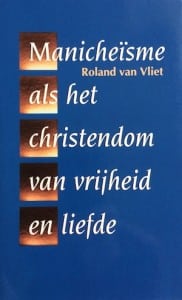Boek – ‘Het Manicheïsme als het christendom van vrijheid en liefde’
Geheel uitverkocht. Een Engelse uitgave verschijnt in augustus 2020 bij Amazon.
Alleen verkrijgbaar in het Duits:
Der Manichäismus – Geschichte und Zukunft einer frühchristliche Kirche.
Urachhaus, € 28,00 – 978-3-8251-7585-6.
Is in Maart 2012 verschenen bij Triades in Frankrijk als Le Manichéisme – Un christianisme de la liberté et de l’amour.
Naast de ontdekking van de Nag Hammadi-teksten en de Dode Zeerollen zijn in de 20ste eeuw de archeologische opgravingen van manichese teksten van bijzonder grote waarde gebleken. Vooral de vondst van de Keulse Mani-Codex in 1969 heeft eraan meegewerkt dat het manicheïsme steeds meer als de tweede hoofdstroom van het christendom wordt beschouwd. Roland van Vliet beschrijft de historische invloed en de actuele betekenis van deze tweede hoofdstroom. Hij toont ondermeer aan, dat verschillende dogma’ s in het katholieke christendom gegeven zijn met de reactie van Augustinus op zijn manichese verleden. De leer van de erfzonde en predestinatie was het antwoord op de manichese leer van de reïncarnatie. Mani (216-277) bracht het geloof in harmonie met het bovenzinnelijke weten. Centraal stonden voor hem de vrijheid van het waarheidsonderzoek van het individu, en de liefde die, zonder haar wezen te verliezen, zich verbindt met het kwaad, zodat dit kan worden omgevormd.
SUMMARY
In this book the author gives a new vision on the manichaean cosmology and christology, supported by the new archeological findings in 1930 and 1969, Mani (216-276), calling himself an apostle of Christ, has linked the idea of reincarnation with christianity. The author states that the dogma of original sin is in some way St. Augustin’ s substitution of the idea of moral heritage by past lives in manichaeism. The author argues that there is no absolute dualism and no docetism, but monotheism and (gnostic) adoptianism in manichaeism (based on thesis in Contra Faustum). No docetism, because Christ in manichaeism suffers as a real human being after baptism in the river Jordan; when god became man; when Christ adopted Jesus the apostle of Light. There is also theodicee: God has permitted evil into the world in order of the world in order to individualise, through reproduction, the universal soul of mankind in Adam. Because there is evil, there is the possibility of free will to choose between good and evil. And if man can freely choose for goodness, this may give rise to love. The basic theme in this second mainstream of christianity is freedom to find divine truth and love that can transform evil. The ethics of Mani ask man to have a universal sacramentalism, a moral relation to Jesus Patibilis everywhere in nature and mankind. Therefore you can call the christianity of the Paraclete a christianity of love with a perspective into the future.

